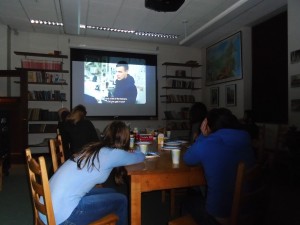By Maxi Albrecht
German Language Intern
During the recent Martin Luther King Jr. week, I was asked to participate in the “Fighting for Your Rights: Civil Rights Movements Across the World” international student panel. I chose to speak on the topic of PEGIDA, which is a current anti-Islamic movement in Germany. This blog will recap some of the information I shared their, as well as some of my opinions on this issue. First off, however, I would like to make it very clear that I am personally saddened that this is even happening in Germany and was for quite some time, and especially so at the time of the panel quite worried by the prospects.
PEGIDA is an acronym for Patriotische Europäer gegen die Islamisierung des Abendlandes, which translates into Patriotic Europeans against the Islamization of the Occident. Many English press reports translate it into … Islamization of the West. I, however, argue that the translation with Occident is more fitting as it highlights the constructed nature of the argument. After all, Edward Said has said that the Occident has always (ab)used the Orient in order to construct its own image by pronouncing the former’s otherness.
Essentially, PEGIDA is a populist movement that is founded in both a general criticism of the current political administration and in targeted anti-Islamic sentiments and propaganda. PEGIDA was founded in October 2014 in Dresden by Lutz Bachmann in reaction to violent outbreaks between Salafists and supporters of the Kurdistan Workers’ Party in Celle and Dresden during demonstrations against ISIS. What then started as a Facebook group by Bachmann against arm shipments to the Kurdistan Workers’ Party, quickly turned to weekly demonstrations on Monday evenings. PEGIDA itself has dubbed these demonstrations “evening strolls.” The very first of these, held on October 20 in Dresden, was only attended by 350 people, but as this populist movement gained momentum, numbers began to increase. The slogans and rallying cries of the protesters focus largely on fears of religious war in Europe, vilify Muslims and stress the preservation of a ‘European’ or ‘German culture.’ December saw a drastic increase in protesters in Dresden, with 17,500 in the streets, as PEGIDA instrumentalized Christmas and Christian values to mobilize supporters against a supposed Islamic threat. The ‘evening strolls’ featured protesters singing German Christmas songs in December. Since, there have sprung up various other groups in other cities, such LEGIDA in Leipzig or FraGIDA in Frankfurt to name just two examples. The epicenter remains Leipzig, which incidentally has an extremely small number of inhabitants with an immigrant background, and an even lower number with Muslim backgrounds, compared with other German cities.

PEGIDA demonstration in Dresden. Source: Wikipedia
Another slogan frequently employed by the PEGIDA supporters was “Wir sind das Volk.” (We are the people.) As I have already said the demonstrations are held on Mondays. This is no coincidence. “Wir sind das Volk” is an iconic German slogan that has been used in Georg Buechner’s drama Dantons Tod regarding the French Revolution and also in Ferdinand Freiligrath’s poem Trotz Alledem during the Revolutions of 1848. It was, above all, the slogan the protesters of the Peaceful Revolution chanted during the famous Monday Demonstrations in 1989-1990, which contributed massively to the downfall of the GDR and to the unification of Germany as a democratic country. The political message and strength of employing such slogans in Dresden, which is located in the former GDR, cannot be understated. Yet, this also highlights the insidious adoption of a slogan symbolizing the fight for Civil Rights in the context of a movement that aims to deny said rights to a part of the German population.
Paragraphs 1 and 2 of Article 1 of the Grundgesetz (Basic Law of the Federal Republic of Germany, our equivalent to the US Constitution) state: “Men and women shall have equal rights. The state shall promote the actual implementation of equal rights for women and men and take steps to eliminate disadvantages that now exist. No person shall be favoured or disfavoured because of sex, parentage, race, language, homeland and origin, faith, or religious or political opinions. No person shall be disfavoured because of disability.”
The law is clear. In Germany, all are supposedly equal before the law. The fear-mongering and hate that PEGIDA intends to spread are in my opinion very problematic. Then again, there are those that say that freedom of speech is equally important. I will not attempt to settle that age-old debate, but I think the fact that this is happening in Germany, where the last century’s history has shown so shockingly clearly what this kind of hate and xenophobia and racism can lead to, the fact remains to be stressed, that all are equal before the law and it is precisely because of the historical past of Germany that has led to our current laws, that I personally think it should never be forgotten.
Luckily, there are quite a lot of people in Germany who agree on that. There have been various counter-movements to PEGIDA and co. When the Cologne offspring of PEGIDA was marching before Christmas, the famous Cathedral’s lights were symbolically switched off to demonstrate that there was no support to be had for them there. In many cities, whole streets switched off their lights in a passive yet symbolic resistance. There have been countless counter-demonstrations and marches all over Germany drawing up to 100,000 participants. Angela Merkel, Germany’s chancellor, has publicly condemned agitation against minorities and immigrants. Many politicians, celebrities, and common people have made their non-support clear. There has been harsh criticism from all strata of society. The debate has even taken over social media before Christmas. As winter was bearing down, the hashtag #schneegida was created. Schnee means snow in German. Tweets read ironic messages such as “#schneegida because I do not want to have to cover my face with a scarf” or “#schneegida, against the ICElamization of Europe.”
In either case, I think that it is sad and horrifying to see how things such as religion are instrumentalized to increase hate and to advance views that are in my opinion inhumane. Germany has become a multicultural country and while that of course brings its challenges with it, I hope that people can also see the opportunities there are in it. After all, I am writing this as a German in a foreign country.




 On Tuesday, February 24,
On Tuesday, February 24, 





 Some people call it Chinese New Year; some people call it Lunar New Year and some people call it Spring Festival “春节”. The first one is never my favorite way, as this festival is celebrated by several other countries, too; the second one is merely an explanation of what it is; the third one is the most touching one for me, because it is more beautiful, more commonly used to describe this festival and more related to my life in China. If asked how important it is to Chinese people, I’d like to take myself as an example. This is my first time in my whole life that I didn’t celebrate it with my family.
Some people call it Chinese New Year; some people call it Lunar New Year and some people call it Spring Festival “春节”. The first one is never my favorite way, as this festival is celebrated by several other countries, too; the second one is merely an explanation of what it is; the third one is the most touching one for me, because it is more beautiful, more commonly used to describe this festival and more related to my life in China. If asked how important it is to Chinese people, I’d like to take myself as an example. This is my first time in my whole life that I didn’t celebrate it with my family.